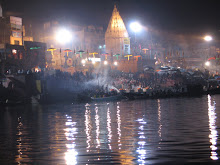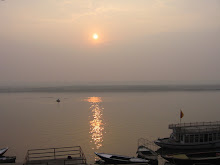In the past week, my travels took me to the fabled holy city of Varanasi where religious multitudes gather for a variety of reasons – to wash away their sins, to await their last and preempt rebirth, to buy peace for the soul of a loved one and sometimes, just to soak in the positive vibes and find peace.
I arrived in the city with much anticipation, but Banaras with its filthy streets, rough denizens and greedy priests, proved to be an assault on my senses from the very first moment. Even the boat ride on the Ganges at sunrise proved to be a highly overrated and far from tranquil experience, because of the filth bestrewn water.
If there is a river which has withstood sustained abuse and gross disrespect, then it has to be this holiest of holy rivers. As I was rowed across the length of the Ganges in the wee hours of the morning, past the crowded ghats where people performed all manner of ablutions in the purported holy waters, I could not help but wonder at the Indian psyche which is simultaneously, able to venerate and abuse.
What I mean to say is that almost every practicing hindu household has a corner for prayer and pooja, which is normally the cleanest nook in the house. We take great care to maintain the sanctity of this space. Shoes are a no-no. Flesh meant for consumption is carefully kept away. And, one enters this hallowed space only after much cleansing of one’s body.
In the hindu mind, the word 'holy' has as its handmaidens, cleanliness and deep reverence.
So in Varanasi, which is reputedly so sacred a land that death on its soil guarantees one a direct passage to heaven, it is only natural to assume it to be the very epitome of cleanliness and the recipient of much respect and reverence if not by visitors, then at least by its residents. On the contrary, one is greeted by the sight of human and animal excreta, plastic, paan and urine splattered walls, garbage of all kind and mindless littering.
A morning sail on the Ganges showcases life in India at its worst – people bathing and blithely washing their clothes, urinating, defecating, tossing overboard the remnants of their meal or the plastic bottles and bags in which they had carried their meal. We would not do this in our houses, let along in our corners of worship. So why desecrate this purportedly holy space and river which is deemed to be so many times more sacred than anything we can hope to create in our houses?
In the two days I stayed there, the only redeeming feature was the soothing sail across the Ganges in the twilight. As I bobbed about watching the Ganga Arathy, I wondered if the filth spread by the devotees and the greed of the priests had driven the gods away from the holy city. And as that thought crossed my mind, a gentle drizzle began, the arathy concluded and it occurred to me that perhaps, the Holy Ganges, like most mothers, wasn’t giving up on her children especially those who came seeking her with love, respect and hope.
Monday, December 17, 2007
Subscribe to:
Post Comments (Atom)







3 comments:
Very well presented.
Nicely written.....
deep thoughts...and a very warm conclusion.
Post a Comment